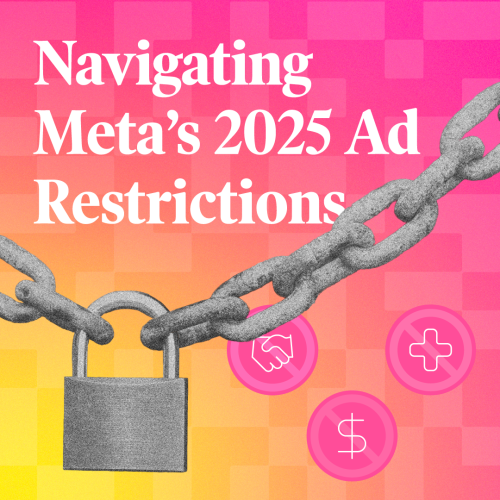
Purposeful and strategic advertising delivers results while simultaneously saving time and money. Meta tools have streamlined this process to ensure that services and products are placed in front of the most relevant audiences. However, the changing advertising policies around sensitive ad categories will take effect across all Meta Platforms in 2025. Without a doubt, Meta ad policy changes will significantly impact strategic advertising on social media. Accordingly, to continue growing audiences and ensure campaign resonance, brands must adapt their data collection methods and advertising strategies.
Why is Meta Changing its Advertising Policy?
Worldwide there has been a growing focus and concern around privacy, specifically the sharing of sensitive user data. Enforcement of stricter regulations has resulted in consequences for companies infringing on consumer’s right to privacy. For example, in 2023 The Federal Trade Commission (FTA) acted against GoodRx for the non-consensual sharing of consumer health information with companies, advertising agencies and online platforms. The result was a $1.5 million penalty as well as a mandated implementation of remedial actions and change of policies.
Within this context, Meta is categorizing brands and websites in relation to if and how they associate (and use) user interactions with sensitive conditions. This better ensures compliance with country laws and regulations around sensitive information and industry guidelines. It will also result in protected information not being shared or used purposely or unintentionally by the Meta tools. A similar policy was implemented by Google in February 2024.
What are the Meta Ad Policy Changes 2025?
Meta ad policy changes regarding sensitive ad categories practically translate into reducing the functionality of Meta’s business tools. Once applied they will restrict mid and lower-funnel events such as Add to Cart by blocking these types of events. Conversions API (CAPI) will be limited such that they will not be able to share or track restricted events. This includes server-side APIs.
What are Meta’s Prohibited Information Categories?
Meta has 4 sensitive conditions (events). If applicable, the associated information is prohibited from being shared and used on their platforms as well as with Meta. These are:
- Information from or about children under 13 years old.
- Customer information parameters that aren’t hashed.
- Unpermitted identifiers such as finance information, for example, credit card numbers.
- Any information that is regarded as sensitive under applicable laws, regulations, and industry guidelines. For example, information relating to an individual’s physical or mental health, health conditions or places of treatment.
What are the Sensitive Ad Category Restrictions?
The restrictions brought about by the changes in sensitive ad categories are divided into two types of limitations.
- Full Restrictions
- No user information or data linked to restricted events will be able to be tracked, analyzed, or processed.
- Restricted or prohibited use and capability of Meta tools, for example, Pixel and CAPI, for tracking or optimizing sensitive events.
- Partial Restrictions (mainly affect the optimization of mid and lower funnels)
- No user information or data linked to restricted events will be tracked, analyzed, or processed.
- The blocking of some pixel events.
Which Sectors Are Going to Be Affected?
There are several sectors which will be affected by the Meta advertising policy changes. The most impacted are companies within the Health and Wellness sectors as well as Finance and Political sectors. For these sectors, Meta will restrict or entirely limit advertisers’ access to information that falls within specifically identified source categories.
Meta’s Data Source Categories
- Health and Wellness.
- Financial Products and Services.
- Unsuitable Content.
- Politics.
- Race.
- Religion.
- Sexuality.
- Gender Identity.
- Nationality.
- Trade Union.
- Personal Hardship.
Meta automatically identifies and categorizes data. Consequently, individuals and companies are advised that to ensure accuracy they must review and manage their assigned categories.
How To Adapt and Stay Compliant
The reality is customizing audiences is going to be more challenging within the new Meta ad policy framework. This means in the short term the probability of a decelerated rate of increasing an audience base is high. To combat this, you will need to use alternative methods to find and target audiences. Specifically, ones that gather useful data sans personally identifiable information (PII). For example, utilizing data collected by browsers and servers via cookies or using surveys and questionnaires to increase campaign success. Additionally, third-party analytics could be drawn upon to inform advertising strategies.
The starting point for mitigating the impact of these changes is to ensure that your brand’s source category classification is correct. If you believe an error has been made then an appeal with Meta needs to be logged.
The next step is to broaden advertising messaging so as not to be explicit and to eliminate the use of category-specific titles or labels. For example, avoid using titles that include the words wellness or health. Another savvy adaptation is to ensure that advertising campaigns only focus on non-restricted events such as landing page views.
Finding a Way Forward
Successfully adapting to Meta’s ad policy changes will require proactive engagement and continuous learning. If you are in a protected category, consider ways to diversify your marketing presence as well as your overall goals on Meta and similar paid advertising platforms. Investing in a solid organic strategy via social media and SEO are essential and should be considered your first stop to begin combatting future restrictions on lower funnel goals. Also, be aware that with all policy changes, advertisers will find ways to adapt, so it will be equally important to remain nimble and to pivot your marketing strategies as changes unfold.To that end, it helps to work alongside an accomplished and experienced advertising agency that will operate like an extension of your in-house team. Contact SocialQ to partner with an agency that provides expert guidance, crafts data-driven strategies and is results-oriented.
